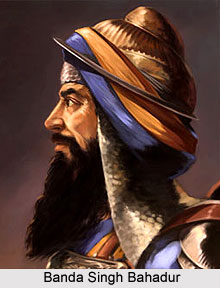 Banda Singh Bahadur was born in the house of Ramdev, an ordinary ploughman and a Rajput of the Bhardwaj clan on 27 October 1670 at Rajouri in Poonch district of Jammu. He was then named as Lachhman Das. The area in which he was born was a very backward area and education was by and large restricted to the Brahmin community. Therefore, Lachhman Das had no regular schooling in the early years of his life. During his adolescent age, he spent most of his time working in the fields like other boys and as he grew up he took to hunting and riding. He was then highly proficient in the use of bow and arrow. Banda was also a great hunter.
Banda Singh Bahadur was born in the house of Ramdev, an ordinary ploughman and a Rajput of the Bhardwaj clan on 27 October 1670 at Rajouri in Poonch district of Jammu. He was then named as Lachhman Das. The area in which he was born was a very backward area and education was by and large restricted to the Brahmin community. Therefore, Lachhman Das had no regular schooling in the early years of his life. During his adolescent age, he spent most of his time working in the fields like other boys and as he grew up he took to hunting and riding. He was then highly proficient in the use of bow and arrow. Banda was also a great hunter.
As Lachhman Das grew up, his father arranged his education in elementary study of languages, arithmetic and use of weapons of warfare. He then also acquired some reasonable knowledge of Sanskrit during his childhood and during his period of bairag. It is said that while he was in Nanded he possessed a book of Tantrik powers given to him by Aughr Nath at Panchavati, from which he cultivated occult powers.
Ascetic Life of Banda Bahadur
Being a great hunter Banda Bahadur often used to spend time in hunting. It is said that during one of his hunting expedition Lachhman Das shot a doe. As he approached the injured animal, the pitiable looks of the dying animal struck a tender chord in his heart. When he opened its stomach to clean the animal, he saw two still to be born offspring drop out of its womb and die before his eyes. He was greatly disturbed by that scene and an urge arose in him from within to shun hunting as a sport. This incident also became a turning point in his life and he moved away from other mundane things of daily life.
Lachhman Das was now no longer a Rajput, but an ascetic. Rajouri town was on the way to the shrines in the Kashmir valley. The sadhus and ascetics very often came to Rajouri. They stayed there for a while stay for a while and moved on to the shrines of their pilgrimage. Lachhman Das started spending time with these sadhus and ascetics. He tried to understand their way of life and the rituals and austerities performed by them. Much later Lachhman Das came under the influence of a bairagi Janaki Prasad. His association greatly influenced the agitated mind of the young lad. Lachhman Das then abandoned his family and house and joined Janaki Prasad on his pilgrimage. He was given a new name Madho Das. For some time his first halt was at Sadhaura.
Although Madho Das had accompanied Janaki Prasad, he still somehow could not get the required guidance for his mental peace and solace. His heart still remained in a disturbed state of mind. In the year 1687 he accompanied Janaki Prasad to attend the Baisakhi fair at the shrine of Baba Ranthaman that is located in the neighbourhood of Kasur. There he accepted the discipleship of another bairagi, Guru Ram Das. However, here too he could not find the real peace of mind real peace of mind. It was still as elusive from him as ever. With time Madho Das entered the unknown world of sadhus and ascetic warriors spread all over India. His journey from the north to the south covered the most important formative and constructive period of his life which was almost 20 years. It covered a period from 1688 to 1708.









